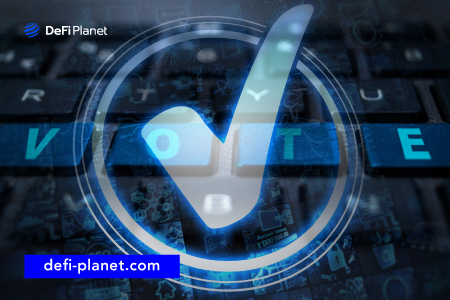Every new day, the potential uses of blockchain technology have continued to increase and now span across areas of finance, supply chain, health, and government. One of the major uses of this technology in government is in the area of voting.
Electoral processes are prone to manipulation and fraud. It is quite worrisome in some developing nations where electoral officers and the masses have to deal with physical security threats besides the normal altering of vote figures.
The 2020 Presidential elections in the United States became the most scrutinized in the history of America. The ex-President Donald Trump had alleged manipulation in every inch of the electoral process. There are, however, suggestions that there wouldn’t have been a need for the rancor if blockchain voting was used.
This article will cover the necessity of blockchain in elections, use cases, as well as challenges preventing blockchain voting from becoming mainstream.
Let’s begin!
Overview of the Typical Electoral System
The word voting is not strange. It is the process through which a group of people of either an organization, local council, state, or country comes together to choose a leader.
A wide range of voting systems exists. While some of these systems are being used in today’s world, others remain theoretical. FairVote identifies three main voting systems to include:
- Majority systems
- Proportional representation systems
- Semi-proportional systems
It is important to note that each of these voting systems has its advantages and disadvantages.
Majority systems
The majority voting system is used in the United States and several other countries worldwide. This system works in a way that the contestant with the highest number of votes is declared the winner of the election.
Common plurality systems like the single-winner, as well as the two-round runoff all fall under this category.
Proportional representation system
This system of voting ensures that parties are represented proportionally in the legislature. This system typically works in some advanced Western democracies and includes the party-list system as well as mixed-member proportional representation.
Semi-proportional systems
This system produces less proportional results than the fully proportional system. However, it produces more proportional results than the majority system. This system is used in local elections in the United States.
Why is it necessary to use blockchain in electoral processes?
As stated earlier, blockchain has found application in many areas of the economy. More recently, it has found application in the process of governance and electioneering.
Voting is seen as a diplomatic way through which a group of people will have a say. Without voting certain decisions will not be taken.
With the application of blockchain technology in electioneering processes, actions that otherwise would mar the conduct of free and fair elections will be eliminated.
Below are some reasons why blockchain is necessary for voting.
Transparency
Though transparency is one of the features of blockchain, it is also a factor that electorates lookout for to trust election results. Without transparency, a question tag is always placed on the outcome of voting results, resulting in allegations of illegitimate, manipulated, and falsified votes.
Because the blockchain works in a decentralized manner, all data stored on it is replicated and distributed across all nodes connected to the system. This results in a trustworthy democratic process and positive outcomes of elections.
When all votes are accurately recorded, collated, and securely stored on the blockchain, it becomes immutable. This means any form of manipulation or alteration of votes will be eliminated.
Because all participants have access to records on the blockchain, it means users will be able to see while votes are being tracked at various polling units and counted.
Security
Security is a major challenge in voting processes. The situation is quite troubling in regions where the ballot box systems are still in use. Besides dealing with issues of manipulation of voting figures, they may also have to face physical security threats like ballot box snatching and thuggery.
If sufficient security is not provided in e-voting systems, malicious actors, otherwise known as hackers, could gain access to the system and manipulate voting outcomes.
With the use of blockchain technology, security will be enhanced, thus preventing hackers from having access to the system. This is because as soon as voting is completed, results are accurately counted and verified before being added to the blockchain.
In the absence of blockchain technology, an electoral body may oversee the election process. Because this is a centralized process, it is prone to security breaches such as the manipulation of vote figures. In the event where an electoral official is bribed, results may be altered to favor a particular candidate.
Anonymity
During voting processes, voters would probably not want others to know who they voted for. This is because people want privacy. Blockchain technology has anonymity as a feature, thus protecting the identity of voters.
During the process of transactions on the blockchain, users will have the ability to use their private keys to stay anonymous. The same applies to blockchain voting. Because the blockchain enables anonymity, more people will have the zeal to vote.
Processing time
Voting systems, be it the ballot box system or e-voting, take a very long time to collate. Voting has different stages, from the polling unit to collation and announcement. All of these contribute to making the process quite slow.
When polling stations are scattered all over the country, gathering all voting data may increase unnecessary costs, cause inefficiency and take much time.
However, with the use of blockchain technology, all these limitations will be eliminated because instead of polling stations to manually transmit results, all participants connected to the network will instantly see the outcome. As soon as voting is completed-results will be quickly gathered and processed.
Use Cases of Blockchain in Electoral Systems
The blockchain has proved to be transparent in voting processes. As a result, many countries are beginning to adopt this technology to oversee elections. DeFi Planet will be sharing some countries that have used the blockchain in its electioneering process at some point.
Sierra Leone
Prior to its 2019 elections, Sierra Leone deployed a blockchain network to count votes together with its official vote counter in the Western District of the country. Agora rolled out the project.
The process was marred by controversy as the country’s electoral body released a statement saying they did not make use of blockchain in the election.
Japan
In 2020, Tsukuba City was the first Japanese City to introduce blockchain voting. The network was introduced by LayerX, a Japanese blockchain startup.
It is important to note that Tsukuba is yet to use the system in government elections, however, it has been used to vote for social development proposals. LayerX uses Japan’s “My Number” system as credentials to confirm registration. and also allowing voters to cast their votes remotely.
Russia
Russia has always had interests in blockchain-backed voting and has deployed a number of networks for elections which has often ended in allegations of mismanagement, ballot stuffing, and data leaks.
In the September 2020 by-elections, two different blockchains were used. Russian Telecoms giant Rostelecom used a private version of Waves blockchain in Kruskaya and Yaroslavskaya. The network used a proof of authority mechanism.
On the other hand, the Department of Information Technologies deployed an Exonum-based system used in the constitutional amendment election.
United States
The blockchain electronic voting system has been used by the United States to conduct elections in the 2018 West Virginia midterm election, as well as the 2020 Presidential election in Utah County. Voatz, the for-profit electronic voting application was used in both cases.
The technology which promised total encryption and security allowed members of the armed forces abroad to vote remotely using face recognition and other biometric IDs.
Voatz, on its website, claims to also return a receipt of the ballot to voters and is also capable of tracking it.
Other potential countries that could use blockchain to elections in the nearest future include India, South Korea, and Thailand.
Challenges of Using Blockchain in Elections
There are several challenges standing in the way of blockchain voting becoming mainstream. If these issues are not thoroughly sorted, this technology will not be used on large-scale voting processes.
First is the issue of technical know-how. Since most people have little understanding of how the blockchain works, deploying it for elections will be very difficult. Though mass enlightenment may be carried out, it doesn’t mean that each person in the population will get a grasp of how it works during elections.
Another challenge is that even election experts may find it difficult to identify possible electoral irregularities when it comes to e-voting systems. However, they may find it easy to inspect and audit paper votes.
In Conclusion…
- The many properties of the blockchain comprising transparency, trust, short processing time and anonymity have made it useful in many areas of the economy, including governance and voting.
- The use of blockchain has the ability to eliminate the long-standing issues of electoral malpractice and fraud.
- In fact, some countries have started using it to fast-track their electoral processes. Some of these countries include Sierra Leone, Japan, Russia, and the United States.





















